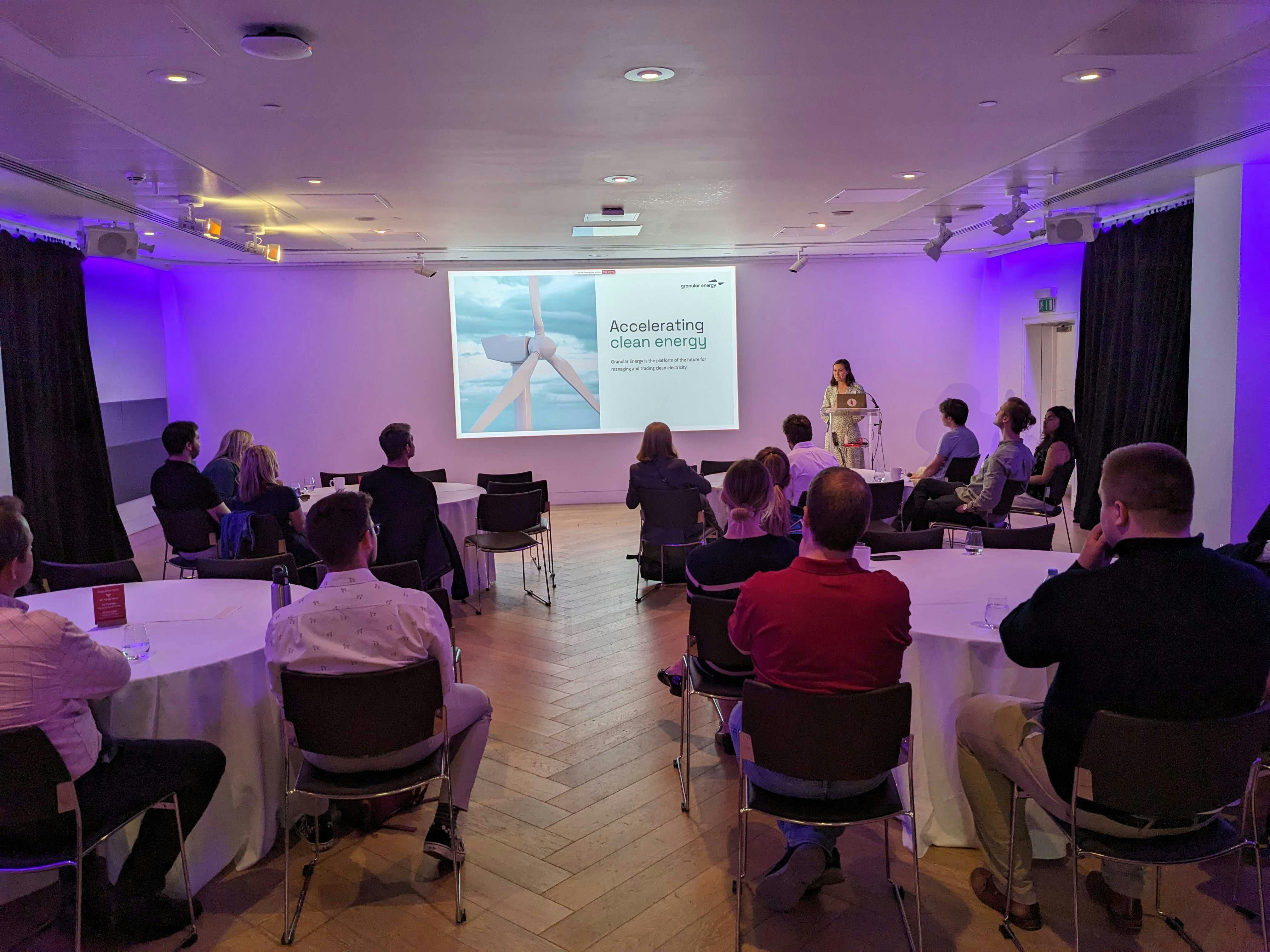Insight · 15 July 2024
Event Roundup: System Implications of 24/7 Carbon-Free Energy Trading
Granular Energy hosted a workshop with speakers from Afry, Nordpool, Climate Group and DLA Piper on the system implications of 24/7 Carbon-Free Energy Trading (CFE). Read our key takeaways.

With hourly matching tariffs now available in the UK to all business buyers, this workshop was an opportunity for both UK energy suppliers and buyers to discuss the implications of 24/7 CFE and the impacts it would have on the grid. The discussion covered the challenges and opportunities of designing 24/7 carbon free products, including regulatory constraints, transparency, and end-user uptake.
Read our key takeaways:
The concept of a 24/7 product is evolving
24/7 CFE products are still relatively new to the market, and as a result the concept is still evolving. It isn’t yet clear which metrics consumers will be most interested in, or what granularity and hourly matching scores will be considered the standards. However, there is significant momentum in the space. The Climate Group, the entity behind RE100, has launched a 24/7 CFE review, to encourage 24/7 CFE adoption on top of the existing RE100 commitments they already track. The UK Green Buildings Council has set hourly matching goals as part of its guidance on renewable energy procurement, giving an initial suggestion of hourly matching targets. In the US, the Treasury has proposed new rules for the 45V hydrogen production tax credit, requiring green hydrogen to be produced entirely from time matched clean electricity.
24/7 CFE will empower consumers to decarbonise their electricity all the time
As customers gain increased transparency in where their energy comes from, they make increasingly green choices which decarbonize the grid faster. As customers seek to purchase green electricity at all hours of the day, assets that are able to output green electricity when needed will get a price premium for it, making investment into the assets more attractive and driving innovation. Analysis shows that even a small movement in this space (10% of commercial and industrial consumers moving to 100% hourly matching) has the potential for huge carbon reductions
A small proportion of 24/7 CFE electricity demand will have a massive impact on the UK’s electricity system as a whole
Afry, Nordpool and Granular Energy are currently conducting a pilot with National Grid ESO on the topic. In a first phase, the project partners will identify areas where a 24/7 CFE market would lead to different operation of 24/7 CFE assets. They will analyse times of day when the 24/7 CFE market may be short, for instance times when emissions are high but wholesale prices are low, and how this will change the behaviour of storage assets such as batteries.
Later in the pilot, the parties will run a 24/7 CFE trading pilot. It will be a first of a kind analysis into the impacts of a 24/7 CFE market on the GB system and will aim to answer key questions: how will 24/7 CFE will affect the dispatch market system; where will storage investment have the most impact; and how will 24/7 CFE effect energy cross boundary energy flows.
Licence and law changes will accelerate hourly matching and therefore the transition to 24/7 CFE - but aren’t blocking it from happening already
24/7 CFE is a matter of when, not if. The uptake of 24/7 CFE requires changes to laws and licenses and in most places the demand for 24/7 CFE products has outpaced regulatory adjustments. Registry support for granular certificates is key, and while countries such as Hungary and Estonia are making progress, more registries need to join the effort.
Currently, 24/7 CFE is achievable by bundling Renewable Energy Guarantees of Origin (REGOs) with their corresponding metering data to create “shaped REGOs.” This approach does not require changes to existing laws, making 24/7 products already available.
However, as we start trading these shaped REGOs, there is an added challenge: determining who owns any additional value created by the shaping. Current Power Purchase Agreements (PPAs) often do not clearly specify who owns the ‘value’ of a generator's metering data. Additionally, PPA wording varies between contracts, meaning ownership can differ on a case-by-case basis.
Granular Certificates will become a new commodity
Granular Certificates (GCs) are on their way to becoming tradable assets: power market operator Nordpool will host pilot auctions in September. These auctions will assess the interest of participants in the different categories of 24/7 CFE (technology, location, etc) whilst also trialing different options for exchange rules, such as collateral requirements, margining and settlement.
The auctions hope to prove that a market signal can arise and in doing so learn about the price dynamics of this market. The mechanics of the trading pilot are still in the design phase so If you’d like to participate in either the market design or the pilot auction itself, get in touch.

At Granular Energy we actively work on these topics. Our tools enable suppliers to better manage the costs and risks in energy certificate portfolios, and to create new clean supply offers that give customers far greater transparency on where their energy comes from than has existed before.
Share article
More insights
Case study · 05.02.2026
Building the digital backbone for energy attributes certificates: South Pole and Granular Energy partnership
Granular Energy is pleased to announce a new partnership with South Pole. This collaboration marks an important innovative step in renewable energy certificate management across global markets.
News · 03.02.2026
Carbon-Free Chronicles January 2026: The essential round-up of news and reports relating to hourly transparency
We’re back with our Carbon-Free Chronicles, and as we move into 2026, the focus across energy markets is shifting from consultation and experimentation to implementation. Reporting deadlines have passed, policy signals are sharpening, and the market is moving. The direction of travel is clear: higher-quality, time-matched clean energy claims are moving from “nice to have” to “expected”.